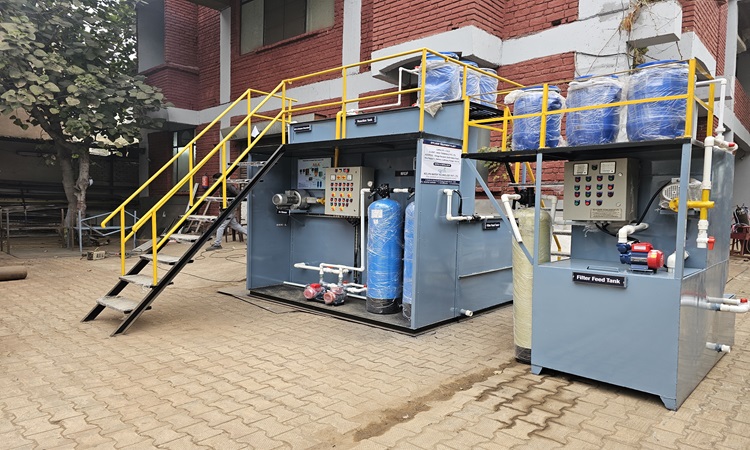Importance of Effluent Treatment Plant in Modern Industry and Environmental Protection

Effluent Treatment Plants play a vital role in managing industrial waste and protecting the environment from harmful pollutants. With increasing industrialization, the volume of wastewater generated by factories and manufacturing units has grown significantly. If not treated properly, this effluent can contaminate water bodies, soil, and even the air, leading to serious environmental and health hazards. ETPs are designed to treat industrial wastewater, making it safe for discharge or reuse, thereby supporting sustainability and compliance with environmental regulations.
What is an Effluent Treatment Plant?
An Effluent Treatment Plant is a system used for treating wastewater and effluents produced by industrial processes. These plants remove harmful contaminants such as chemicals, heavy metals, oils, greases, and other toxic substances from wastewater before releasing it into the environment or municipal sewage systems.
The primary objective of an ETP is to ensure that the water discharged is within the permissible environmental limits set by regulatory authorities like the Central Pollution Control Board (CPCB) in India or the Environmental Protection Agency (EPA) in other countries.
Why Effluent Treatment is Essential?
a. Environmental Protection
Industries generate a wide range of pollutants through their manufacturing activities. If these pollutants are directly discharged into rivers, lakes, or the ground, they can degrade ecosystems, harm aquatic life, and contaminate groundwater. ETPs prevent this by removing contaminants and ensuring that only treated, safe water is discharged.
b. Public Health and Safety
Toxic effluents, if left untreated, can pose serious risks to human health. They can contaminate drinking water sources and agricultural fields, leading to illnesses such as skin diseases, respiratory problems, and gastrointestinal issues. Proper treatment ensures that communities living around industrial zones remain safe.
c. Regulatory Compliance
Most countries have stringent environmental laws that require industries to treat their wastewater before discharge. Non-compliance can result in hefty fines, license cancellation, or legal action. Installing and operating an ETP ensures that companies meet these regulatory standards and avoid penalties.
d. Reuse and Resource Recovery
Treated water from ETPs can be reused for various non-potable purposes such as cooling, cleaning, gardening, or even in some industrial processes. In certain setups, valuable materials like oils or heavy metals can also be recovered during the treatment process, turning waste into a resource.
Key Industries that Require ETPs
Many industries produce high volumes of wastewater with toxic substances. Some of the key sectors include:
- Textile and dyeing industries – release chemicals and dyes.
- Pharmaceutical industries – discharge organic compounds and solvents.
- Food and beverage processing – produce organic waste and oils.
- Chemical manufacturing – release hazardous and corrosive substances.
- Oil and petroleum refineries – discharge hydrocarbons and sludge.
- Paper and pulp industries – emit high-BOD (Biological Oxygen Demand) effluents.
How Does an Effluent Treatment Plant Work?
An ETP typically consists of several treatment stages:
a. Preliminary Treatment
This stage involves removing large solids, grit, and grease from wastewater using screens, grit chambers, and oil-water separators.
b. Primary Treatment
Physical and chemical processes are used to settle suspended solids and reduce the organic load. Coagulation and flocculation are common methods used to clump smaller particles together for easier removal.
c. Secondary Treatment
Decompose organic matter using microorganisms in the effluent. Techniques like activated sludge process (ASP), Moving Bed Biofilm Reactor (MBBR), or Sequencing Batch Reactor (SBR) are employed depending on the nature of the effluent.
d. Tertiary Treatment
This final stage further polishes the treated water by removing remaining suspended particles, nutrients (like nitrogen and phosphorus), and pathogens. Techniques like sand filtration, reverse osmosis, or UV disinfection are used.
e. Sludge Management
The solid waste or sludge generated during treatment is also processed, dewatered, and either safely disposed or used as compost, depending on its composition.
Benefits of Using Effluent Treatment Plants
a. Sustainable Industrial Operations
ETPs allow industries to operate responsibly by minimizing their environmental footprint and conserving water resources.
b. Improved Corporate Image
Businesses that invest in proper wastewater treatment demonstrate social responsibility and environmental stewardship. This can enhance their brand image and appeal to eco-conscious consumers and investors.
c. Cost Savings in the Long Run
While the initial investment in an ETP may be significant, long-term savings are realized through water reuse, reduced penalties, and potential recovery of valuable by-products.
d. Protection of Natural Resources
ETPs help in preserving the quality of natural water bodies and groundwater, which is essential for agriculture, drinking water supply, and overall ecosystem health.
e. Support for Circular Economy
By recycling treated water and recovering useful materials, ETPs promote a circular economy model where waste is minimized, and resources are reused.
Challenges in Effluent Treatment
While ETPs offer numerous benefits, they are not without challenges:
- High operational and maintenance costs
- Skilled manpower required
- Variability in effluent quality
- Sludge disposal issues
Role of Manufacturers like Kelvin Water Technologies
Leading ETP manufacturers such as Kelvin Water Technologies Pvt. Ltd. play a pivotal role in designing and deploying high-performance treatment plants tailored to industry needs. With expertise in modern technologies like MBBR, SBR, and tertiary treatment systems, Kelvin Water Technologies ensures that clients achieve:
- Compliance with CPCB and SPCB norms
- Optimum treatment efficiency
- Reduced operational overheads
- Turnkey solutions including installation, commissioning, and AMC
By choosing a reputed manufacturer, industries can ensure their ETPs remain reliable, efficient, and compliant throughout their lifecycle.
Conclusion
The importance of Effluent Treatment Plants cannot be overstated in today’s industrial landscape. They are essential not just for legal compliance but for the protection of our environment, public health, and water resources. As the pressure to adopt sustainable practices grows, ETPs offer a practical solution for industries to manage their wastewater responsibly. Companies that invest in effective effluent treatment not only safeguard nature but also future proof their operations, gain public trust, and contribute to a cleaner, greener planet.